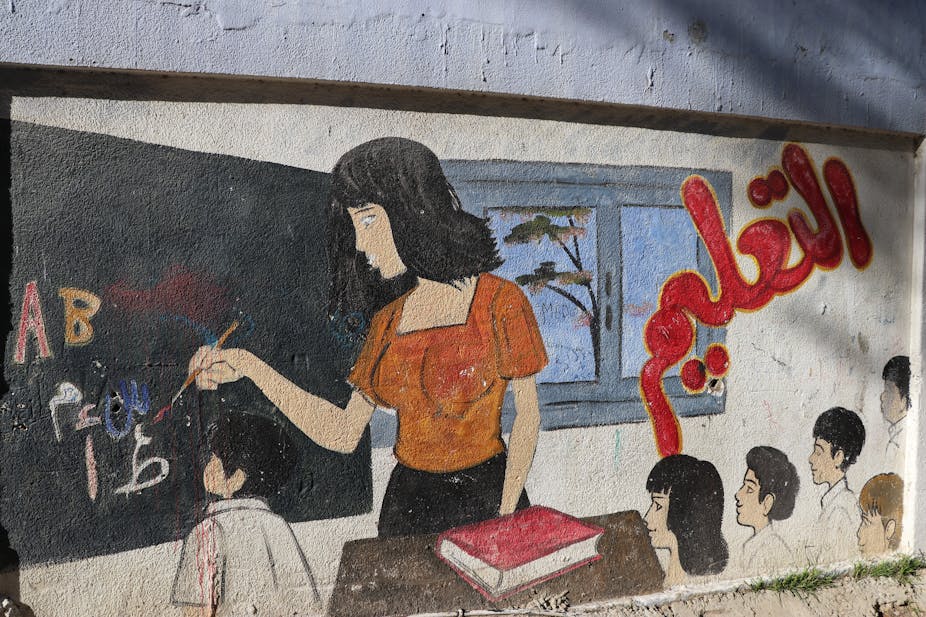The livelihoods and long-term futures of thousands of Palestinian refugee families across Lebanon, Jordan, Syria, Gaza and the West Bank are at risk due to Donald Trump’s catastrophic decision to cut the American donation to the UN Relief and Works Agency for Palestine Refugees (UNRWA).
The US president’s decision to contribute only US$60m to UNRWA in 2018 – instead of US$125m – has been widely denounced as a brutal form of collective punishment for the Palestinian people.
To fill the gap in UNRWA’s budget, on January 22, its commissioner-general, Pierre Krähenbühl, launched a major emergency fundraising campaign. The #DignityIsPriceless campaign aims to mobilise donor states and civil society worldwide to secure funds to keep open the 700 UNRWA schools that educate 525,000 Palestinian children. It also aims to ensure that UNRWA can continue providing lifesaving emergency food aid, emergency cash assistance, and essential medical services to millions of Palestinian refugees across the Middle East. Krähenbühl said: “At stake are the rights and dignity of an entire community.”
There is clearly an urgent need to fill an immediate gap to keep schools and medical services open. However, a related, unspoken crisis is also threatening Palestinian refugees’ future in another way: if services are at threat there is also a looming employment crisis for the tens of thousands of Palestinians who provide these services as UNRWA staff.
Palestinian jobs and pensions at risk
UNRWA is both an agency that provides services and assistance, and the employer of 30,000 Palestinians, including doctors and nurses, teachers, psycho-social workers and administrative and support staff.
UNRWA’s budget has been precarious since its inception in the 1950s and in December 2017 it had a deficit of US$49m. Because of this, in addition to its full-time employees on fixed-term and indefinite contracts, UNRWA has long employed thousands of people on daily contracts, often for years and even decades on end. These precariously employed “dailies” are called upon to fill short-term gaps as they arise, including as substitute teachers and doctors to cover sick leave.

Many UNRWA employees – including the Palestinian teachers, guards and sanitation workers I have been speaking with across Lebanon as part of my ongoing research – fear that their jobs and very futures are at risk. Potential redundancies in Lebanon’s educational vocational centres have already been announced. My interviewees inform me that dozens of UNRWA “dailies” have either been made redundant or have not had their contracts renewed since Trump’s announcement.
Exceptional measures and major insecurities
On January 17 2018, UNRWA headquarters in Amman, Jordan sent UNRWA employees an internal Area Staff Circular noting that, “in view of the severity of the funding shortfall that the Agency currently faces,” the commissioner-general was announcing a series of exceptional measures.
The circular – which a number of my interviewees personally showed me – announced that UNRWA would no longer grant any extension of service to those over 60-years-old, the official age of retirement, and that posts that become vacant because of retirement would not be filled “until further notice”. The conversion of fixed-term appointments to indefinite appointments was also suspended. This means that staff with ten years of continuous service would no longer automatically be eligible for an indefinite appointment.
Sara, a Palestinian teacher I interviewed in early February, told me her heart dropped when she read this circular. Born in a camp in Lebanon, Sara – whose name has been changed – was first employed as a “daily” teacher, and, for the past eight years, as a fixed-term, full-time UNRWA employee. Since 2012, she has been teaching Palestinian children from Syria who arrived in Lebanon seeking sanctuary. She explained why she felt that her future had been pulled out from under her:
If my contract is not converted to an indefinite one, I will have nothing to support me or my family after I am 60. As a ‘B’ employee [the term Palestinians use to refer to workers on fixed-term UNRWA contracts], I would only receive my own savings (tawfeer) as a lump sum, with no contribution from UNRWA.
This is because upon retirement, only UNRWA employees who are on indefinite contracts (known as “A” employees) are eligible to receive the full “Provident Fund” lump sum or what Palestinians refer to as ta’weed: the full compensation paid by UNRWA for their many years’ service.
Ta’weed combines monthly contributions that are deducted directly from Palestinian refugees’ monthly salaries (the tawfeer), plus an UNRWA contribution. As UNRWA employees receive no monthly pension after retirement, without the combined payment Sara would effectively only receive her own savings (tawfeer) in one lump sum, which would never be sufficient to support herself and her family as she grows older.
My interviewees told me they were partially relieved to receive a second UNRWA circular on January 21, stating that “the conversion of fixed-term to indefinite appointment is reinstated.”
However, they remained concerned that with UNRWA’s ongoing financial insecurity, it won’t actually be possible for fixed-term staff to be offered indefinite contracts in the coming years. And they also remain concerned about the future of their pensions.
A fair future
In light of what UNRWA itself has called the “worst financial situation in its 70-year history”, Palestinian staff members are being implored to continue serving the refugee community.
However, UNRWA employees and their families are facing increasing insecurities. They fear for what the future may hold, both for their employment prospects, and for their lives beyond retirement.
For each UNRWA staff member whose contract is not made indefinite, for each person made redundant or removed from the “daily” roster, for each potential employee not recruited to fill a gap left by retirement, and for each person whose full “Providence Fund” (ta'weed) may not be paid by UNRWA, an entire family’s and community’s livelihood is being undermined.

